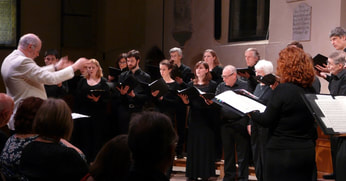 I’m going to be heading up to York next month to rehearse my new piece Absence with the wonderful Micklegate Singers. They commissioned me to set a beautiful Quaker funerary text by William Penn. They will be giving it premiere at York's Late Music series on December 3rd at 1pm, please do join us. The piece I’ve written builds on my deep interest in the rituals we create around death. This interest first surfaced in my piece Ceasing for Sansara, which used stories of death to build a kaleidoscopic, personal text from the choir’s experiences and my own. A touchpoint for me was Derek Parfait’s Reasons and Persons. This book breaks down conventional ideas of personhood, viewing our personhood as a continuing chain of experiences rather than a thing in-and-of itself. This prompts him to re-think his understanding of death:
"After my death, there will no one living who will be me. I can now redescribe this fact. Though there will later be many experiences, none of these experiences will be connected to my present experiences by chains of such direct connections as those involved in experience-memory, or in the carrying out of an earlier intention. Some of these future experiences may be related to my present experiences in less direct ways. There will later be some memories about my life. And there may later be thoughts that are influenced by mine, or things done as the result of my advice. My death will break the more direct relations between my present experiences and future experiences, but it will not break various other relations. This is all there is to the fact that there will be no one living who will be me. Now that I have seen this, my death seems to me less bad." In Penn’s text, I saw something of this philosophy: the idea that when friends die, ‘they live in one another still.’ This suggested something of the tone I wanted to take in my setting: music that was serious, direct, and stirring but not anguished or hopeless. Generally, my musical language draws heavily on alternative tunings; I’m fascinated by the tonal possibilities of quartertones and just intonation. This approach is challenging for singers. I had a great time working on quartertone harmony in Now Is A Long Time for the Fellowship octet of the National Youth Choir of Great Britain, but it is an approach that requires specialism and extended rehearsal. For this piece, I wanted to find a simplified harmonic language that nonetheless felt authentically my own. Georgian polyphony is a significant source of inspiration for my approach in this piece. Like my microtonal writing, Georgian vocal music is oriented around stacked fifths and fourths. These move in unfamiliar ways, contracting and expanding in parallel movements that feel counterintuitive to me yet profoundly satisfying and resonant. The power of these parallel fifths and the weight with which they converge in moments of unison felt appropriate for this work. I hoped to write a register both serious and yet surprising, open to movement and joy.
1 Comment
10/11/2022 01:40:01 pm
Micklegate Singers are very much looking forward to giving the world premiere of this stunning and exciting piece. We hope that you may be able to join us on December 3 lunchtime concert as part of the late music festival.
Reply
Leave a Reply. |
NewsYou can find out about recent and upcoming projects here, and stay up-to-date with email or RSS below.
Archives
July 2024
|
|
All photographs by Ilme Vysniauskaite
|
 RSS Feed
RSS Feed